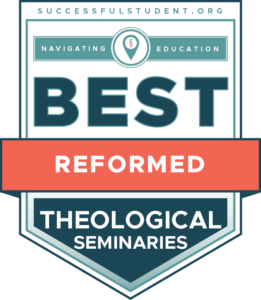| Rank | School | Location |
|---|---|---|
| 1 | Princeton Theological Seminary | Princeton, New Jersey |
| 2 | Westminster Theological Seminary | Glenside, Pennsylvania |
| 3 | Westminster Seminary California | Escondido, California |
| 4 | Knox Theological Seminary | Fort Lauderdale, Florida |
| 5 | New Brunswick Seminary | New Brunswick, New Jersey |
| 6 | University of Dubuque | Dubuque, Iowa |
This is a ranking of the Best Reformed Theological Seminaries in the United States. This ranking is designed for students to be informed of college options for studying at a reformed seminary.

Reformed seminaries prepare graduates to serve churches in the Presbyterian or Reformed tradition. Many students become pastors, missionaries, or church educators and counselors. Reformed, generally speaking, means the church that became Reformed in the protestant reformation of the 16th century.
In common usage Reformed often means adhering to John Calvin's theology, including Limited Atonement and Irresistible Grace. The Reformed tradition has created some of the highest echelon of higher learning institutions. These colleges and universities have played a major part in educating Americans for decades, and their contributions have had a tremendous influence in American culture.
These degree programs are open to students across different faith backgrounds, and may study scripture and receive theological instruction from these seminaries.
Students may study subjects such as Practical Theology, History, Ministry, and Divinity. Students can study the history of Christianity, classic literature, Greek, Hebrew, and systematic theology. Depending on if they are going to ministry, they may study preaching pedagogy.
Graduates from these seminaries are often called to ministry, but many into teaching. Students often pursue advanced degrees, such as Master's and PhDs. Some pursue professorships at universities across the nation after graduating.
Next Step: Get Degree Information

The Best Reformed Theological Seminaries
Ranking Methodology
Successful Student strives to rank schools and programs for the benefit of students, to help students make sense of the many options in education. The criteria for this ranking was including schools with a heritage in the Reformed tradition, degree offerings and variety, and academic influence. For more information about our methodology see our College Calculator.
Princeton Theological Seminary
Princeton, New Jersey
Princeton Theological Seminary was founded in 1812 by the General Assembly of the Presbyterian Church.
The Seminary continues in the Reformed tradition to this day. Students learn in an environment of faith, scholarship, and leadership.
Students also learn key skills for ministry (such as integrity, compassion, and joy). There are five key areas of study available:
- Biblical Studies
- History and Ecumenics
- Practical Theology
- Religion and Society
- Theology
The degree programs include:
- Master of Divinity - a three-year, 78-credit degree that is the professional program for students interested in ministry
- Master of Arts in Christian Education and Formation - a two-year, 52-credit degree with three degree tracks
- Teaching
- Spiritual Formation and Mission
- Ministry with Young People
- Master of Arts in Theological Studies - a two-year, 52-credit degree
- Master of Theology - a one-year, 24-credit degree that is an excellent supplement the MDiv degree
- Duel Master of Divinity/Master of Arts in Christian Education and Formation - a four-year, 104 credit degree
- Doctor of Philosophy - offers 12 fields of study based on the five key areas
Admissions: The majority of programs require official academic transcripts, a letter of pastoral endorsement, and three letters of recommendation. Admissions strongly encourages interviews. Admissions material varies based on the desired program. Students should note that faculty only allow a maximum of two admission attempts.
Westminster Theological Seminary
Glenside, Pennsylvania
Faculty at Princeton Theological Seminary left and founded Westminster Theological Seminary in 1929. Today Westminster continues its high levels of scholarship and the Word of God.
Westminster emphasizes systematic theology, presuppositional apologetics, historical theology, and other subjects for ministry.
There are nine comprehensive programs available through Westminster. The Graduate programs include:
- Master of Divinity - three to four year degree, requires 111 credits
- Master of Arts in Religion - two to three year degree, requires 74 credits
- Master of Arts in Theological Studies - two year degree, requires 36 credits, available completely online
- Master of Arts in Counseling - two to five year degree, requires 60 credits, available completely online
The postgraduate programs available are:
- Master of Theology - two to three year degree, requires six to eight courses, supplements the Master of Divinity
- Doctor of Ministry - four to five year degree, requires eight courses
- Korean Doctor of Ministry - five year degree, requires eight courses
- Doctor of Philosophy - four to five year degree, requires ten courses
There is one additional program in Mastering Theological English (MTE) for students with English as a second language (who have TOEFL scores below the minimum requirement for admission to Westminster at large). The MTE program prepares such students for success in the MDiv, MAR, and DMin programs.
Admissions: Admissions requirements vary by program, however most often students must submit prior academic transcripts, two to three essay questions, a pastoral reference and academic references. Doctoral candidates may also have to submit a current resume and sample sermon.
Westminster Seminary California
Escondido, California
Westminster Seminary in California, founded in 1980, educates students for pastoral positions. They seek to balance spiritual and academic growth in future church leaders. These leaders will serve within the Presbyterian and Reformed denominations.
Other faiths are welcome. An ecumenical spirit exists within a student body, representing more than 25 denominations.
Today there are four Master's degrees available:
- Master of Divinity - a three to four-year program which requires 110 credits including Biblical Languages
- Master of Arts in Biblical Studies - a two-year degree which requires 72 credits
- Master of Arts in Historical Theology - a two to three-year degree which requires 72 credits
- Master of Arts in Theological Studies - a two-year degree which requires 72 credits
Several non-degree opportunities are also available. WSC keeps membership in the Consortium of Associate Schools of Jerusalem University College. Students have the opportunity to take short-term courses at Jerusalem University College.
Classes like Jesus and His Times, and Geographical and Historical Settings of the Bible, give life to the Bible's historicity.
Admissions: In addition to the online application, students must submit previous academic transcripts and ecclesiastical and academic references. Admissions may request an interview or GRE test scores.
Knox Theological Seminary
Fort Lauderdale, Florida
In 1989, Dr. D. James Kennedy founded the Knox Theological Seminary. This independent evangelical school caters to students from a variety of denominational backgrounds.
The Seminary encourages civil conversation within ecumenicalism. However, the Seminary expects all enrolled students to affirm the Apostle's Creed.
Knox Seminary maintains a mission to educate spiritual leaders within the Reformed tradition.
These leaders will teach and live out the Gospel of Jesus Christ. Faculty and staff hold to God's sovereignty, Biblical inerrancy, and the Great Commission.
The following degree programs are available:
- Master of Divinity - 90 credits, up to 30 of which must be completed on campus. Three to five-years to completion.
- Master of Arts in Biblical and Theological Studies - 60 credits. Three to five-years to completion.
- Master of Arts in Christian and Classical Studies - 48 credits. Two to three-years to completion.
- Doctor of Ministry - 30 credits. Three to six-years to completion. Offers three tracks:
- Theological Exegesis
- Biblical Preaching and Teaching
- Gospel in Church and Culture
Students have the option to complete the Master's programs completely online. A variety of online individual courses and certificate programs are also available.
Admissions: Admissions requirements vary by program. Most programs require previous academic transcripts and pastoral and academic letters of recommendation. The Doctoral program also requires a previous Master of Divinity degree, or its equivalent, and a minimum of three years pastoral experience.
New Brunswick Seminary
New Brunswick, New Jersey
The New Brunswick Seminary, founded in 1784, is the oldest independent Protestant institution. Affiliated with the Reformed Church of America, students are yet diverse and ecumenical. Professors emphasize high standards of academics.
This includes excellence in ministry, critical thinking, and personal reflection. The urban setting of the Seminary allows for students to act justly and lead faithfully.
Enrollment is flexible, with full and part-time, day or evening options. Online options are also available.
The available degree programs include:
- Master of Divinity - 81 credits, three to six-years time to completion
- Master of Arts in Pastoral Care and Counseling - 48 credits, two to four-years time to completion
- Master of Theological Studies - 48 credits with an average of two-years time to completion. The curriculum allows for a number of elective classes for students to create their own area of concentration that meets their career goals. Students may take a vocational focus or a PhD preparation focus.
- Dual Master of Divinity/Master of Arts in Pastoral Care and Counseling - 96 credit, four to seven-years time to completion. Students must take classes in four consecutive modules.
- Doctor of Ministry - average three-years time to completion with one-week intensives three times each year. Offers four areas of concentration:
- Prophetic Urban Ministry
- Transformational Preaching
- Missiology and Global Christianity
- Pastoral Care and Counseling / Pastoral Theology
Admissions: Most programs require students to submit previous transcripts, a statement of purpose, and two to three letters of recommendation. Doctoral candidates must also submit a critical essay and have a minimum of three years ministry experience.
University of Dubuque
Dubuque, Iowa
Founded in 1852, the University of Dubuque manages its own Theological Seminary. They keep connections to the Presbyterian Church. Located in Iowa, the Seminary embraces an ecumenical nature. The school honors other denominations that respect Christian teachings and traditions.
The Seminary encourages community worship and fellowship. This allows students to connect in bible studies, prayer groups, concerts, and missions. Dubuque Seminary maintains a Field Education Program that helps place students in ministries.
This allows for the development of practical service skills and life experience.
Dubuque Theological Seminary offers the following degrees:
- Master of Divinity - 75 credits, distance or residential program
- Master of Arts in Mission Discipleship - 40 credits, distance or residential program
- Master of Arts in Christian Leadership - 30 credits, completely online
- Bachelor of Arts/Master of Divinity program - for undergraduate students at Dubuque to transfer into the Master of Divinity program and complete all requirements within six years
- Doctor of Ministry - offers two focus areas
- Military Chaplaincy
- Pastoral and Congregational Renewal
Other available programs include the Young Adult Ministry Scholars, Education for Laity, Continuing Education, and many other special programs and electives.
Admissions: Admissions requirements vary based on the desired program. Admissions accepts students on a rolling basis.
Accreditation: The Seminary receives accreditation from the Commission on Accrediting of the Association of Theological Schools in the United States and Canada.

For a complete list of online Master of Divinity degrees, see the article Fully Online MDiv Degrees: The Complete List.